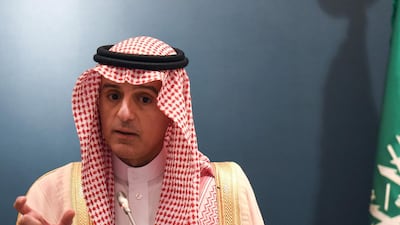Saudi Arabia, the UAE and Bahrain said they supported Morocco’s decision to cut diplomatic ties with Iran, which has been accused of delivering weapons to the separatist Polisario Front in Western Sahara.
Saudi Arabia’s Foreign Minister Adel Al Jubeir said late on Tuesday that Tehran was attempting to destabilise the region by “igniting sectarianism” and by supporting terrorism.
“What Iran has done to the Kingdom of Morocco through its proxies (Hezbollah terrorist organisation) training the so-called Polisario Front is a solid proof of Iran’s interference,” he tweeted.
Rabat said that Iran was using the Lebanese group, Hezbollah, to deliver arms to the separatists.
“Morocco has irrefutable proof, names and specific actions to corroborate the complicity between the Polisario and Hezbollah," Moroccan Foreign Minister Nasser Bourita said in a press conference on Tuesday.
The UAE’s Minister of State for Foreign Affairs Anwar Gargash and Sheikh Khalid Al Khalifa, Bahrain’s Foreign Minister, said that their countries also backed Morocco’s decision.
“We stand by Morocco in its concern over its national issues and against Iranian interference in its domestic affairs,” Dr Gargash said on Twitter. “Our policy and our supportive direction towards Morocco is based on a deep, historical foundation established by Sheikh Zayed and King Hassan, may they rest in peace, and our stance is fixed for better or worse.”
Sheikh Khalid said that Iran was supporting and funding “the enemies of Morocco”, according to the state-owned Bahrain News Agency.
“This requires a collective Arab stance and actions to confront all forms of Iranian interference in the internal affairs of the Arab states and to stop Iran's attempts to threaten Arab security and spread violence and chaos in the region,” he was quoted as saying.
Read more: Morocco cuts ties with Iran over Hezbollah arms transfer to Polisario Front
Dr Gargash on Tuesday also commented on the Qatar crisis, urging Doha to meet the demands of the boycotting countries.
Saudi Arabia, the UAE, Bahrain and Egypt in June last year cut all diplomatic ties with Qatar over its support of extremists and interference in other countries’ affairs. They also accused the country of developing close relations with Tehran.
“Sincere advice meant to get Qatar out of its crisis: there will be no mediation other than a Gulf one, no kind of pressure will work and the media will not change [Qatar’s] situation,” he said on Twitter. “Come back to your sense as your crisis is continuing. Resolve your situation wisely and negotiate within the framework set by your neighbours and that expresses real concerns.”
The four Arab countries stand firm by their decision to boycott Qatar, saying they are willing to re-establish communications with Doha only if it adheres to regional and international agreements and the demands and principles they have issued.
Doha has so far refused to meet the quartet's 13 demands — including the closure of Qatar-owned Al Jazeera news channel, which the quartet says provides a platform for extremists and dissidents.

